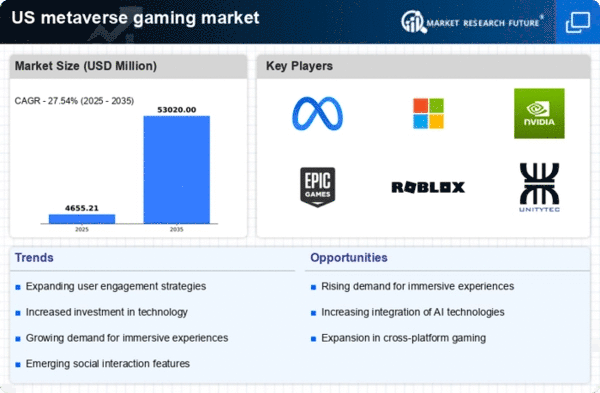Growing Popularity of Esports
The meteoric rise of esports is significantly impacting the metaverse in-gaming market. With millions of viewers tuning in to watch competitive gaming events, the esports industry is projected to generate over $1.5 billion in revenue by 2025. This growth is attracting sponsorships and partnerships, which in turn fuels the development of new games and platforms within the metaverse. As esports continues to gain traction, it is likely to drive interest in the metaverse in-gaming market, as players seek to participate in competitive environments. The integration of esports elements into traditional gaming experiences may further enhance engagement and retention.
Expansion of Cross-Platform Play
The metaverse in-gaming market is benefiting from the expansion of cross-platform play, which allows gamers to interact regardless of their device. This trend is fostering a more inclusive gaming environment, as players can connect and compete with friends on different platforms. In 2025, it is estimated that 70% of gamers will engage in cross-platform play, highlighting its importance in driving user engagement. By breaking down barriers between platforms, developers are likely to see increased player retention and satisfaction, which could lead to higher revenues in the metaverse in-gaming market. This interconnectedness enhances the social aspect of gaming, making it more appealing to a wider audience.
Emergence of User-Generated Content
User-generated content (UGC) is becoming a pivotal driver in the metaverse in-gaming market. Platforms that allow players to create and share their own content are fostering a vibrant community and enhancing player engagement. In 2025, it is anticipated that UGC will account for approximately 30% of all gaming content, reflecting a shift towards collaborative creation. This trend not only empowers players but also encourages developers to incorporate user feedback into their games. As the metaverse in-gaming market evolves, the emphasis on UGC may lead to more personalized and diverse gaming experiences, attracting a broader audience and increasing overall market growth.
Increased Investment in Game Development
Investment in game development is a critical driver for the metaverse in-gaming market. With the potential for high returns, venture capitalists and established gaming companies are pouring resources into innovative projects. In 2025, the total investment in gaming startups is expected to exceed $5 billion, reflecting a growing confidence in the market's future. This influx of capital enables developers to experiment with new concepts, technologies, and gameplay mechanics, ultimately enhancing the quality and diversity of offerings in the metaverse in-gaming market. As competition intensifies, the focus on unique and engaging content will likely attract a broader audience.
Advancements in Virtual Reality Technology
The metaverse in-gaming market is seeing increased demand due to advancements in virtual reality (VR) technology. Enhanced VR headsets and immersive experiences are attracting gamers, leading to increased engagement. In 2025, the VR gaming segment is projected to reach $12 billion in revenue, indicating a robust growth trajectory. This technological evolution allows players to interact in a more lifelike environment, fostering a sense of presence that traditional gaming cannot replicate. As VR technology continues to evolve, it is likely to drive further investment in the metaverse in-gaming market, as developers seek to create more sophisticated and engaging experiences that captivate users.
















